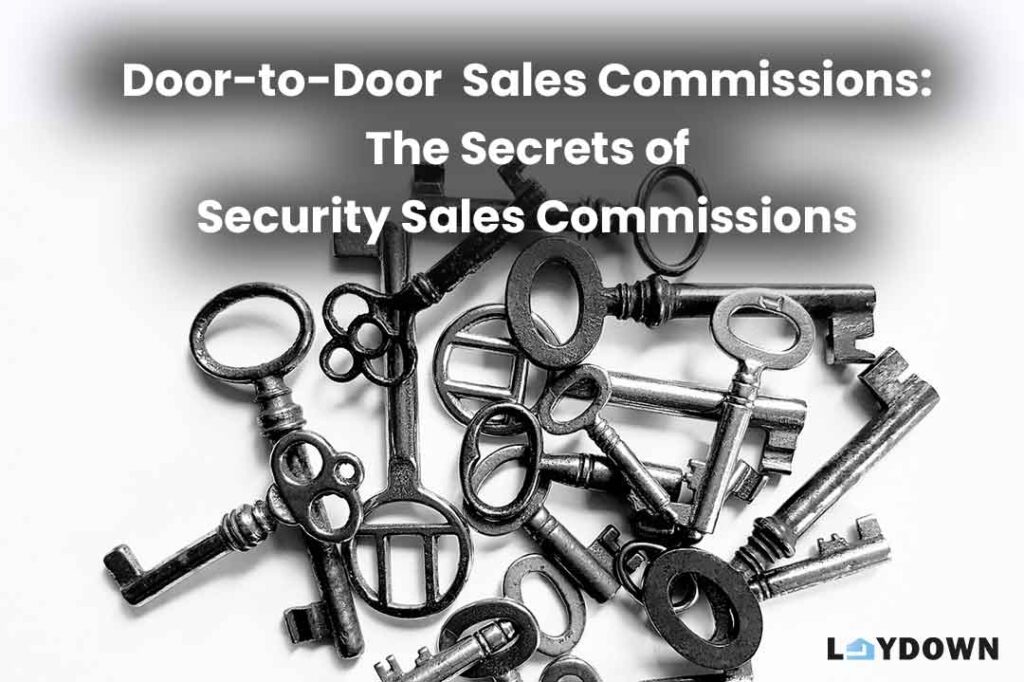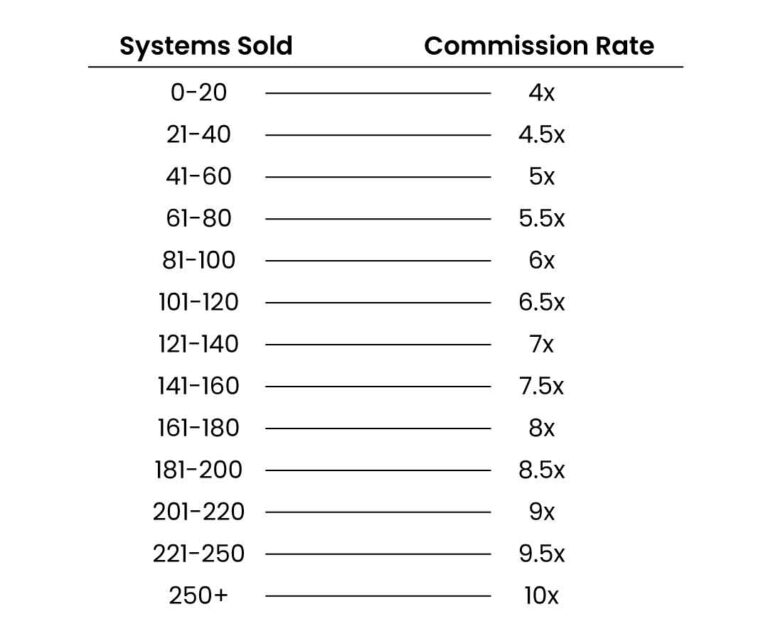The Ultimate Guide to Door-to-Door Security Sales Commissions

In this article, we talk about what goes into the averages of door-to-door security sales commissions. We uncover many hidden industry misconceptions and help you understand what commissions are like in the door-to-door security sales industry.
Similar Articles
Table of Contents
Individual Security System Accounts & Commissions
Door-to-door security sales commission is based on the size of the security system you sell.
Security systems comprise two things: services (connections to emergency services, etc.) and products (cameras, sensors, etc.)
The higher the sales rep can sell the services and products, the more commission they make.
Security companies take the price of the security system sold by the sales rep and multiply it by the sales commission rate.
The average commission rate for a security company is anywhere from 4 to 10x the security system price.
In many cases, the commission rate will increase as the sales rep sells more security systems.
For example, if a sales rep sold a security system for $105.00/month (service price + product price), the sales rep would take home anywhere from $400-$1000 (4-10x depending on total systems sold for the year/summer).
Let’s look at the breakdown of service and product prices in a security system.
Service
For a typical security contract or product agreement, the service price will be anywhere from $24.99-$49.99 a month.
Selling systems at different service prices is totally up to sales reps.
However, if a sales rep lowers the price below $24.99, they will be penalized in their commission check.
These service agreement timelines can vary from 2-5 years and, in some cases, won’t have a contract length at all (this is usually due to financing security equipment).
Products
Sales reps have less control over the price of the products in a security system than the service price.
The total product price concerns what the customer wants on or around their house.
In the past, security companies would rent equipment more often than selling it. However, more and more companies are selling their equipment using customer’s credit.
The average “product” price in a security system is anywhere from $20.00-$100.00+ a month.
For example, here’s an average breakdown of security product pricing per month when purchased on a 5-year service agreement:
Outdoor Camera – $10.00/month
Indoor Camera – $6.00/month
Doorbell Camera – $(usually free with initiation of system)
Motion Light – $3.50/month
Sensors (recessed/glass-break/motion) – $.67/month
Smart locks – $3.00/month
Smart Garage – $3.00/month
Many customers require an individualized plan and creative approaches to help close the sales.
Let’s look at some tools and methods that security sales reps can use to help when closing a sale.
Unique Deductions and Bonuses on Commissions
Deductions:
Note: in all these tools, a sales rep gives up a sales commission percentage to help close the sale. Generally, it is always financially advantageous for the sales rep to use these tools if they cannot get the deal.
- If a customer has a low credit score…
- Sales reps can get deducted from their commission if the customer has a low credit score. A low credit score (< 650) is a liability for the security company. The companies minimize their risk by cutting the sales rep’s commission. There are different strategies; however, in many cases, it is financially advantageous for the sales rep to still sell the system to the customer.
- Selling the system below the minimum service rate (usually $24.00ish)
- If a sales rep is to drop the service rate below the “Minimum” price, it will usually come out of the sales rep commission. However, this can be a sales tool to get the overall cost down to a customer’s budget if need be.
- Discounting the Product price
- By discounting the product price, a sales rep is actually taking this money they are discounting for the customer right out of their sales commission.
- Granting “Free months service.”
- A sales rep can grant customers free month(s) service to close a sale. However, when a sales rep does this, the money comes from their sales commission.
- Buying customers out of existing security system contracts
- When security sales reps “buy” customers out of existing contracts, some of the money going to buy them out will come out of the sales rep’s commission.
Commission Bonuses
Sign-on bonus
- Many times, companies or sales managers will give sales reps bonuses to sign on to their sales team. Sign-on bonuses can be hundreds or even thousands of dollars depending on the sales rep and past experience of a sales rep
The customer pays for the equipment in full.
- If the sales rep’s customer pays for the security system equipment in full (meaning they didn’t use credit to pay for it), the sales rep would get around a 100–200-dollar bonus on the sale.
After breaking down what goes into a single security system sale, let’s talk about how the commission can change with the number of systems sold.
Number of Systems Sold - Commission Rate
Each security company will have different commission rates based on the sales quantity.
However, many of the commission rates will look something like below:

Front-end vs. Back-end Commissions
Front-end Commissions:
Front-end commissions are generally given to a security sales rep week by week.
The front-end commission percentage can vary for different security companies.
However, on average, the front-end commission percentage is anywhere from 20-50% of the total commission per sold security system.
For example, if a sales rep were to sell 4 different security systems in the first week of the summer/year ($410.00 in total recurring revenue), the security company the rep was selling for gave a 40% commission rate in the front-end.
Then, the sales rep would be owed a total of (Total recurring monthly revenue X commission rate X front-end commission percentage) 410 x 4 x .4 = $656.00
Back-end Commissions:
Back-end commissions are not given weekly but at the end of the summer/year.
The back-end commission percentage is the remaining percentage of the total commission.
If the front-end commissions are 40%, the back-end commissions would be 60%.
Back-end checks are usually given 3-4 months after the summer/year.
Funded vs. Unfunded Security System Accounts
Funded vs. Unfunded accounts in all door-to-door sales industries is one of the more complex concepts to understand if you have never had exposure to it, but let me help you understand it a bit more.
When a door-to-door sales rep sells a security system, their customer generally has 3-days to “test” the system. (Otherwise known as “Cancellation period”)
This means that the security company will have their installers install the security system (usually the same day the sales rep sells them the system) and let the customer test the system without penalty if the customer wants to remove the system.
After the 3-days of trial for the customer, the security system account is considered “funded” for a sales commission.
This can be an excellent sales tool for sales reps to use as a “trial close.”
However, it can also lead to sales rep commissions getting emotional and confusing.
If the security system is removed or “pulled” from the home, then the account goes “unfunded” for the sales rep, and they will not receive a commission on that account.
So, many times, door-to-door security system reps will hold their breath until those 3-days are up.
What if a customer stops paying on their system after a few months?
If a customer stops paying on their system after a couple of months, there are a few things that will happen:
- The customer will be reminded of the payments for the equipment and service.
- If the customer forgets to pay for a long time, the equipment loan will be sent to loan collections.
- For the sales rep, if a customer stops paying on the account before the “cut-off date,” the account will go unfunded (won’t be eligible for commission) when the customer misses their payment. (If the customer starts paying on the account, then the account will go back to funded)
Note: The commission cut-off date for account commissions is set by companies and has different future dates depending on the company.
This can make things tricky at the end of the summer/year when calculating sales rep commissions for front-end and back-end commissions.
When a sales rep is granted a week’s commission on, say, 4 accounts, and later, 2 of those accounts go unfunded. Then, the total amount of those 2 unfunded accounts will come out of the sales reps’ back-end commission checks.
Is it confusing?
Let’s look at some examples:
Door-to-Door Security System Commission Examples
Example 1:
Veronika killed it in her 4th year of selling door-to-door sales and finished the summer with 215 systems sold.
Of these 215 security systems sold, 10 accounts went unfunded before the cut-off date, and she was left with 205 funded accounts.
Veronika is trying to determine how much her back-end commissions will be on pay day.
She knows that her total monthly systems equal $23,650.00 (Total recurring monthly revenue for the security company), and her font-end commission was $85,140.
Because Veronika sold 215 systems, her commission rate would be 9x.
So, her full commission for the whole summer would be $23,650 X 9 = $212,850
However, Veronika must account for her 10 accounts that have gone unfunded. So, she subtracts the total commission amount for those 10 accounts, which equals $8,550.
So, her total commission now would equal $212,850 – $8,550 = $204,300
Of the $204,300, he has already received $85,140, so her total back-end amount would be $204,300 – 85,140 = $119,160
Example 2:
Jimmy just finished his summer of door-to-door security sales. He did really good for being a rookie and sold 70 different systems in only 4 months (May–August).
Of these 70 security systems sold, 5 accounts went unfunded before the cut-off date, and he was left with 65 funded accounts.
Jimmy is trying to do the math to see what his back-end commissions should be.
He knows his total monthly systems equal $7,000, and his front-end commission was $14,000 (Total recurring monthly revenue for the security company).
Because Jimmy sold 70 systems, his commission rate would be 5x.
So, his full commission for the whole summer would be $7,000 X 5 = $35,000
However, Jimmy still needs to account for his 5 accounts that have gone unfunded. So, he subtracts the total commission amount for these accounts, which equals $2,500.
So, his total commission now would equal $35,000 – $2,500 = $32,500
Of the $32,500, he has already received $14,000, so his total back-end amount would be $32,500 – $14,000 = $18,500
Conclusion
In conclusion, door-to-door security sales commissions can vary drastically between sales rep skill levels.
The more security systems a sales rep can sell in a summer/year, the more commission percentage the sales rep can make on all of their sold systems.
Commissions with any door-to-door sales industry can be an emotional rollercoaster when you factor in deductions on accounts, commission bonuses, and even funded vs. unfunded accounts.
But if you are looking for a high-paying job for the summer or your career, look more into door-to-door security sales.
Blog Writing
Content is created by our professional blog creation team.
Note: Content is intended to help guide decision making and sale education but not ultimately decide for individuals.
Table of Contents
- Videos
- LayDown Sales
- Anonymous Reviews
Laydown Sales, LLC all rights reserved


